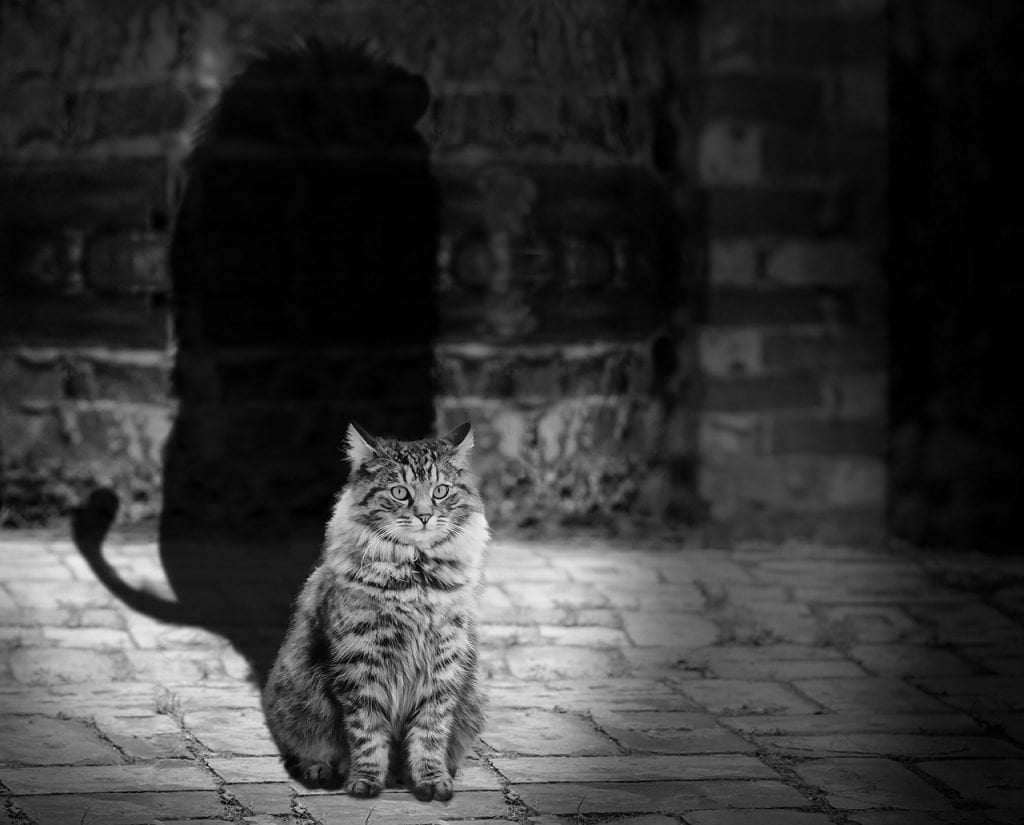Kaz DeWolfe
Image Description: A black and white photograph of a fluffy tabby cat casting a large shadow shaped like a lion.
I have this very rich and fantastical reality in which I (whoever or whatever I am) sometimes reside. I am a super hero. I am god-slayer. I have the power to destroy whole worlds and tear apart the very fabric of reality. I have a dragon that eats fascists alive. If I were to share too much of my internal reality with a psychiatrist, I would likely be labeled as having “delusions of grandeur.” People have been thus psychiatrized for less. For simply having law degrees, or working at a bank. I don’t identify as having delusions of course, in my world, I am simply powerful and grand.
But within consensus reality, I am rather marginalized and don’t objectively have a lot of power. I’m poor and constantly struggling to keep a roof over my head. I’m trans nonbinary and constantly erased. I’m a single parent in world that hates single parents and hates children of single parents. I’m disabled. I struggle with chronic pain. And yet, here I am surviving and throwing around whatever privilege I have. I’m claiming power that I’m not handed, because I am an all powerful inter-dimensional being, dragon lord, destroyer of worlds, and power is mine to wield.
Lately on social media, I keep seeing privileged liberals who objectively have much more power and influence than I have and yet they are just flailing with powerlessness. Fascism has visibly taken hold of the US, and democrats and liberals are angry and scared. I see them complaining and not knowing what to do. Certainly, feelings of powerlessness are totally valid in the face of this sheer horror. But I just wish that more of them were like me and had dragons at their backs. I wish some of them were Supreme Rulers of the planet Xenos. I wish some of them were gods or god slayers. I recently talked to a homeless man who told me he once punched G-d in the teeth. That man clearly knows how to respond to oppressive authority. Liberals, take note.
I think that most of the time that marginalized people are labeled with “delusions of grandeur” when they try to claim the power and privilege awarded to privileged people. Whether our assertions of our status and greatness are backed up by fantastical or mundane narratives, and whether those narratives are objectively true or not, I think that our grandeur is deemed delusion when it challenges an oppressive authority. I refuse to be psychiatrized because I alone am the expert of my experience. I deny that any doctor wields power or authority or expertise greater than my own to conceptualize my experiences. My assertions of power and authority over my life are threatening to those who seek to keep me marginalized and oppressed. And so the DSM has weaponized my power and authority against me. It becomes merely a symptom of a disease.
Refusing to be marginalized is delusion, but then when we admit to being marginalized and voice our distress over our oppression, we have “persecutory delusions.” I think the killing machine I wrote about a few weeks ago would likely be noted on a psychiatrist’s clip board as such a delusion. I seem to believe that the state has built a machine designed to seek out and kill section 8 recipients. Never mind my ability to analyze my vision and see and articulate the oppression I and my neighbors in public housing are experiencing. Its much easier to label people as having persecutory delusions than it is to acknowledge oppression and marginalization and fight for social justice.
I’m not the first of course to realize that psychiatric diagnoses are tools of oppression. Many scholars, critical psychiatrists, and mad-identified people have written discourse on psychiatry as social control. See Szasz, Foucault, Burstow. I’m simply using this space to explore my own experiences of grandiosity and persecution and how they might easily be pathologized in a clinical setting. And what purpose would it serve to call me ill if I claim to be greater than my station, and what purpose would it serve to call me ill if I rightly describe my oppression and marginalization? It seems as if they don’t want people challenging oppression. The only way for an oppressed person to avoid such labels should they find themselves being evaluated by psychiatrists, would be to appear satisfied with one’s lot in life, to take up minimal space and make few demands, to submit to authority, and to not voice any dissent. That person isn’t me. I am not that person.

